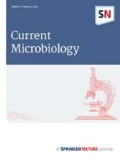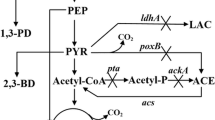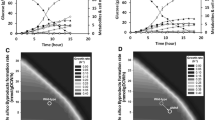Abstract
In this study, to reduce the formation of organic acid during 1,3-propanediol biosynthesis in Klebsiella pneumoniae, a method combining UV mutagenesis and high-throughput screening with pH color plates was employed to obtain K. pneumoniae mutants. When compared with the parent strain, the total organic acid formation by the mutant decreased, whereas 1,3-propanediol biosynthesis increased after 24 h anaerobic shake flask culture. Subsequently, genetic changes in the mutant were analyzed by whole-genome sequencing and verified by signal gene deletion. Mutation of the rpoS gene was confirmed to contribute to the regulation of organic acid synthesis in K. pneumoniae. Besides, rpoS deletion eliminated the formation of 2,3-butanediol, the main byproduct produced during 1,3-propanediol fermentation, indicating the role of rpoS in metabolic regulation in K. pneumoniae. Thus, a K. pneumoniae mutant was developed, which could produce lower organic acid during 1,3-propanediol fermentation due to an rpoS mutation in this study.




Similar content being viewed by others
Abbreviations
- 1,3-PD:
-
1,3-Propanediol
- 2,3-BD:
-
2, 3-Butanediol
- Ace:
-
Acetate
- Suc:
-
Succinate
- 3-HP:
-
3-Hydroxypropionic acid
- Pyr:
-
Pyruvate
- α-KG:
-
α-Ketoglutarate
- HPLC:
-
High-performance liquid chromatography
References
Jun SA, Moon C, Kang CH, Kong SW, Sang BI, Um Y (2010) Microbial fed-batch production of 1,3-propanediol using raw glycerol with suspended and immobilized Klebsiella pneumoniae. Appl Biochem Biotechnol 161:491–501
Wang XL, Zhou JJ, Shen JT, Zheng YF, Sun YQ, Xiu ZL (2020) Sequential fed-batch fermentation of 1,3-propanediol from glycerol by Clostridium butyricum DL07. Appl Microbiol Biotechnol 104:9179–9191
Li Y, Zhu S, Ge X (2019) Co-production of 1,3-Propanediol and 2,3-Butanediol from waste Lard by Co-cultivation of Pseudomonas alcaligenes and Klebsiella pneumoniae. Curr Microbiol 76:415–424
Zhou S, Lama S, Sankaranarayanan M, Park S (2019) Metabolic engineering of Pseudomonas denitrificans for the 1,3-propanediol production from glycerol. Bioresour Technol 292:121933
Chen WC, Chuang CJ, Chang JS, Wang LF, Soo PC, Wu HS, Tsai SL, Wei YH (2020) Exploring dual-substrate cultivation strategy of 1,3-propanediol production using Klebsiella pneumoniae. Appl Biochem Biotechnol 191:346–359
Zhang AH, Zhu KY, Zhuang XY, Liao LX, Huang SY, Yao CY, Fang BS (2020) A robust soft sensor to monitor 1,3-propanediol fermentation process by Clostridium butyricum based on artificial neural network. Biotechnol Bioeng
Lee JH, Jung MY, Oh MK (2018) High-yield production of 1,3-propanediol from glycerol by metabolically engineered Klebsiella pneumoniae. Biotechnol Biofuels 11:104
Kumar V, Park S (2018) Potential and limitations of Klebsiella pneumoniae as a microbial cell factory utilizing glycerol as the carbon source. Biotechnol Adv 36:150–167
Rathnasingh C, Park JM, Kim DK, Song H, Chang YK (2016) Metabolic engineering of Klebsiella pneumoniae and in silico investigation for enhanced 2,3-butanediol production. Biotechnol Lett 38:975–982
Su M, Li Y, Ge X, Tian P (2015) 3-Hydroxypropionaldehyde-specific aldehyde dehydrogenase from Bacillus subtilis catalyzes 3-hydroxypropionic acid production in Klebsiella pneumoniae. Biotechnol Lett 37:717–724
Zhang L, Bao W, Wei R, Fu S, Gong H (2018) Inactivating NADH:quinone oxidoreductases affects the growth and metabolism of Klebsiella pneumoniae. Biotechnol Appl Biochem 65:857–864
Guo XW, Zhang YH, Cao CH, Shen T, Wu MY, Chen YF, Zhang CY, Xiao DG (2014) Enhanced production of 2,3-butanediol by overexpressing acetolactate synthase and acetoin reductase in Klebsiella pneumoniae. Biotechnol Appl Biochem 61:707–715
Xu D, Jia Z, Zhang L, Fu S, Gong H (2020) Analysis of the growth and metabolites of a pyruvate dehydrogenase complex- deficient klebsiella pneumoniae mutant in a glycerol-based medium. J Microbiol Biotechnol 30:753–761
Wang M, Wang G, Zhang T, Fan L, Tan T (2017) Multi-modular engineering of 1,3-propanediol biosynthesis system in Klebsiella pneumoniae from co-substrate. Appl Microbiol Biotechnol 101:647–657
Guo X, Fang H, Zhuge B, Zong H, Song J, Zhuge J, Du X (2013) budC knockout in Klebsiella pneumoniae for bioconversion from glycerol to 1,3-propanediol. Biotechnol Appl Biochem 60:557–563
Zhou J, Wang D, Wang C, Gu J, Kim CH, Shi J, Jiang B, Wang M, Hao J (2017) The role of the pyruvate acetyl-CoA switch in the production of 1,3-propanediol by Klebsiella pneumoniae. Appl Biochem Biotechnol 181:1199–1210
Zhu C, Jiang X, Zhang Y, Lin J, Fu S, Gong H (2015) Improvement of 1,3-propanediol production in Klebsiella pneumoniae by moderate expression of puuC (encoding an aldehyde dehydrogenase). Biotechnol Lett 37:1783–1790
Ko Y, Seol E, Sundara Sekar B, Kwon S, Lee J, Park S (2017) Metabolic engineering of Klebsiella pneumoniae J2B for co-production of 3-hydroxypropionic acid and 1,3-propanediol from glycerol: Reduction of acetate and other by-products. Bioresour Technol 244:1096–1103
Lu X, Fu X, Zong H, Zhuge B (2016) Overexpressions of xylA and xylB in Klebsiella pneumoniae lead to enhanced 1,3-propanediol production by cofermentation of glycerol and xylose. J Microbiol Biotechnol 26:1252–1258
Luo LH, Seo JW, Heo SY, Oh BR, Kim DH, Kim CH (2013) Identification and characterization of Klebsiella pneumoniae aldehyde dehydrogenases increasing production of 3-hydroxypropionic acid from glycerol. Bioprocess Biosyst Eng 36:1319–1326
Luo LH, Kim CH, Heo SY, Oh BR, Hong WK, Kim S, Kim DH, Seo JW (2012) Production of 3-hydroxypropionic acid through propionaldehyde dehydrogenase PduP mediated biosynthetic pathway in Klebsiella pneumoniae. Bioresour Technol 103:1–6
Jiang W, Li W, Hong Y, Wang S, Fang B (2016) Cloning, expression, mutagenesis library construction of glycerol dehydratase, and binding mode simulation of its reactivase with ligands. Appl Biochem Biotechnol 178:739–752
Lin J, Zhang Y, Xu D, Xiang G, Jia Z, Fu S, Gong H (2016) Deletion of poxB, pta, and ackA improves 1,3-propanediol production by Klebsiella pneumoniae. Appl Microbiol Biotechnol 100:2775–2784
Rahman MS, Xu CC, Ma K, Nanda M, Qin W (2017) High production of 2,3-butanediol by a mutant strain of the newly isolated Klebsiella pneumoniae SRP2 with increased tolerance towards glycerol. Int J Biol Sci 13:308–318
Zhang C, Shen H, Zhang X, Yu X, Wang H, Xiao S, Wang J, Zhao ZK (2016) Combined mutagenesis of Rhodosporidium toruloides for improved production of carotenoids and lipids. Biotechnol Lett 38:1733–1738
Jin HX, OuYang XK, Hu ZC (2017) Enhancement of epoxide hydrolase production by (60) Co gamma and UV irradiation mutagenesis of Aspergillus niger ZJB-09103. Biotechnol Appl Biochem 64:392–399
Zhu Z, Wu X, Lv B, Wu G, Wang J, Jiang W, Li P, He J, Chen J, Chen M et al (2016) A new approach for breeding low-temperature-resistant Volvariella volvacea strains: Genome shuffling in edible fungi. Biotechnol Appl Biochem 63:605–615
Fang M, Jin L, Zhang C, Tan Y, Jiang P, Ge N, Heping L, Xing X (2013) Rapid mutation of Spirulina platensis by a new mutagenesis system of atmospheric and room temperature plasmas (ARTP) and generation of a mutant library with diverse phenotypes. PLoS ONE 8:e77046
Datsenko KA, Wanner BL (2000) One-step inactivation of chromosomal genes in Escherichia coli K-12 using PCR products. Proc Natl Acad Sci USA 97:6640–6645
Bao W, Wei R, Liu X, Dong S, Chen T, Fu S, Gong H (2020) Regulation of pyruvate formate lyase-deficient klebsiella pneumoniae for efficient 1,3-propanediol bioproduction. Curr Microbiol 77:55–61
Li H (2011) A statistical framework for SNP calling, mutation discovery, association mapping and population genetical parameter estimation from sequencing data. Bioinformatics 27:2987–2993
Wong GT, Bonocora RP, Schep AN, Beeler SM, Lee Fong AJ, Shull LM, Batachari LE, Dillon M, Evans C, Becker CJ et al (2017). Genome-wide transcriptional response to varying RpoS levels in Escherichia coli K-12. J Bacteriol 199
Gruber TM, Gross CA (2003) Multiple sigma subunits and the partitioning of bacterial transcription space. Annu Rev Microbiol 57:441–466
Deutscher J, Francke C, Postma PW (2006) How phosphotransferase system-related protein phosphorylation regulates carbohydrate metabolism in bacteria. Microbiol Mol Biol Rev 70:939–1031
Seo JH, Hong JS, Kim D, Cho BK, Huang TW, Tsai SF, Palsson BO, Charusanti P (2012) Multiple-omic data analysis of Klebsiella pneumoniae MGH 78578 reveals its transcriptional architecture and regulatory features. BMC Genomics 13:679
Hengge-Aronis R (2002). Signal transduction and regulatory mechanisms involved in control of the sigma(S) (RpoS) subunit of RNA polymerase. Microbiol Mol Biol Rev 66: 373–395, table of contents.
Muffler A, Traulsen DD, Lange R, Hengge-Aronis R (1996) Posttranscriptional osmotic regulation of the sigma(s) subunit of RNA polymerase in Escherichia coli. J Bacteriol 178:1607–1613
Lee IS, Lin J, Hall HK, Bearson B, Foster JW (1995) The stationary-phase sigma factor sigma S (RpoS) is required for a sustained acid tolerance response in virulent Salmonella typhimurium. Mol Microbiol 17:155–167
Schellhorn HE (2014) Elucidating the function of the RpoS regulon. Future Microbiol 9:497–507
Patten CL, Kirchhof MG, Schertzberg MR, Morton RA, Schellhorn HE (2004) Microarray analysis of RpoS-mediated gene expression in Escherichia coli K-12. Mol Genet Genom 272:580–591
Dong T, Schellhorn HE (2009) Global effect of RpoS on gene expression in pathogenic Escherichia coli O157:H7 strain EDL933. BMC Genomics 10:349
Acknowledgements
The work was supported by the National Natural Science Foundation of China under Grant No. 31271862.
Author information
Authors and Affiliations
Contributions
SD carried out the experimental work, statistical analysis, and drafting of the manuscript. K. pneumoniae KG2 strain was isolated by TC, SL, and XL, XZ participated in the design of the experiment. HG contributed to the design and supervision of the study and also the editing of the manuscript. All the authors read and approved the manuscript.
Corresponding author
Ethics declarations
Conflict of interest
We declare that we do not have any commercial or associative interest that represents a conflict of interest in connection with the work submitted.
Ethical Approval
This article does not contain any work done on human participants or animals.
Additional information
Publisher's Note
Springer Nature remains neutral with regard to jurisdictional claims in published maps and institutional affiliations.
Supplementary Information
Below is the link to the electronic supplementary material.
Rights and permissions
About this article
Cite this article
Dong, S., Liu, X., Chen, T. et al. Mutation of rpoS is Beneficial for Suppressing Organic Acid Secretion During 1,3-Propandiol Biosynthesis in Klebsiella pneumoniae. Curr Microbiol 79, 218 (2022). https://doi.org/10.1007/s00284-022-02901-w
Received:
Accepted:
Published:
DOI: https://doi.org/10.1007/s00284-022-02901-w




